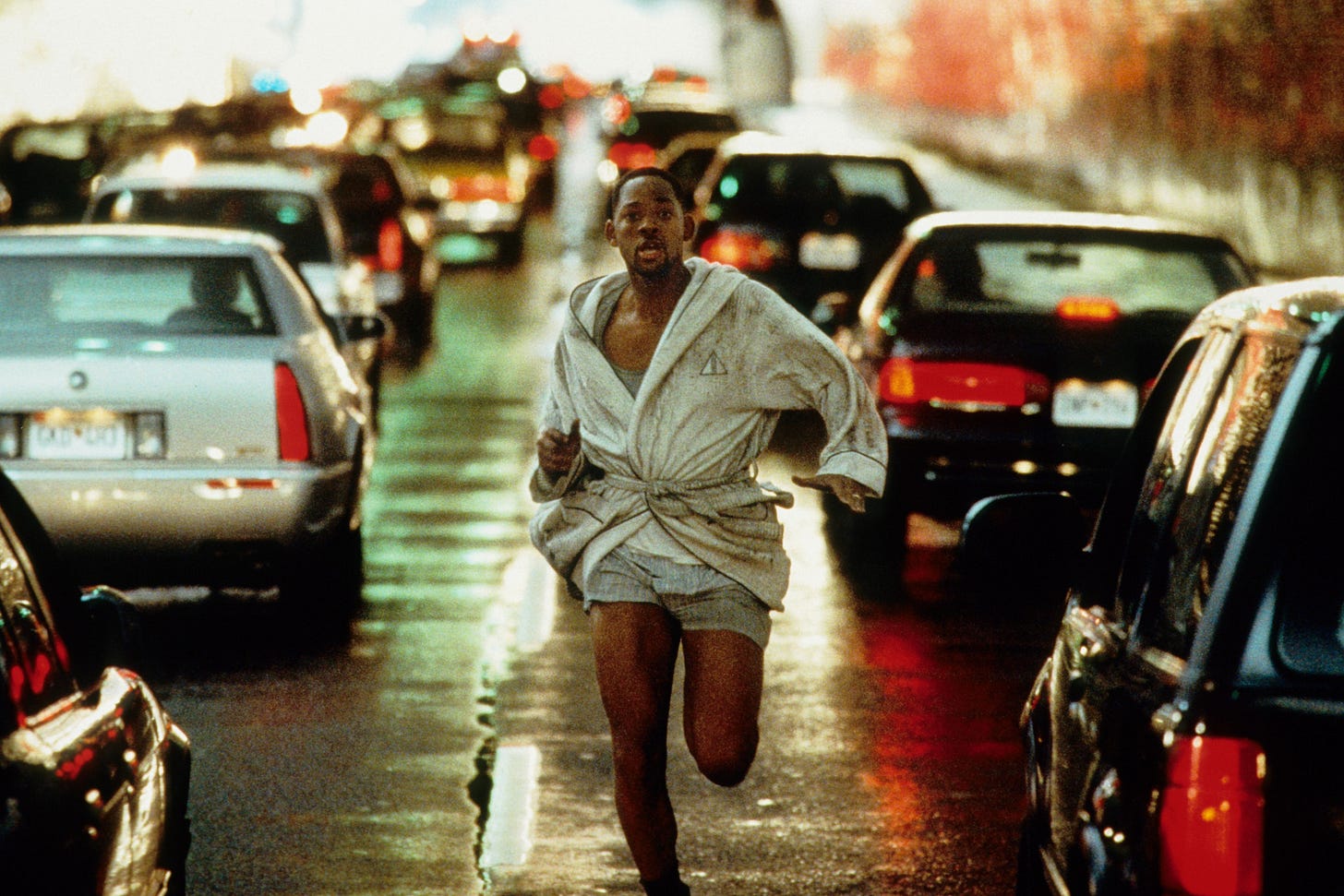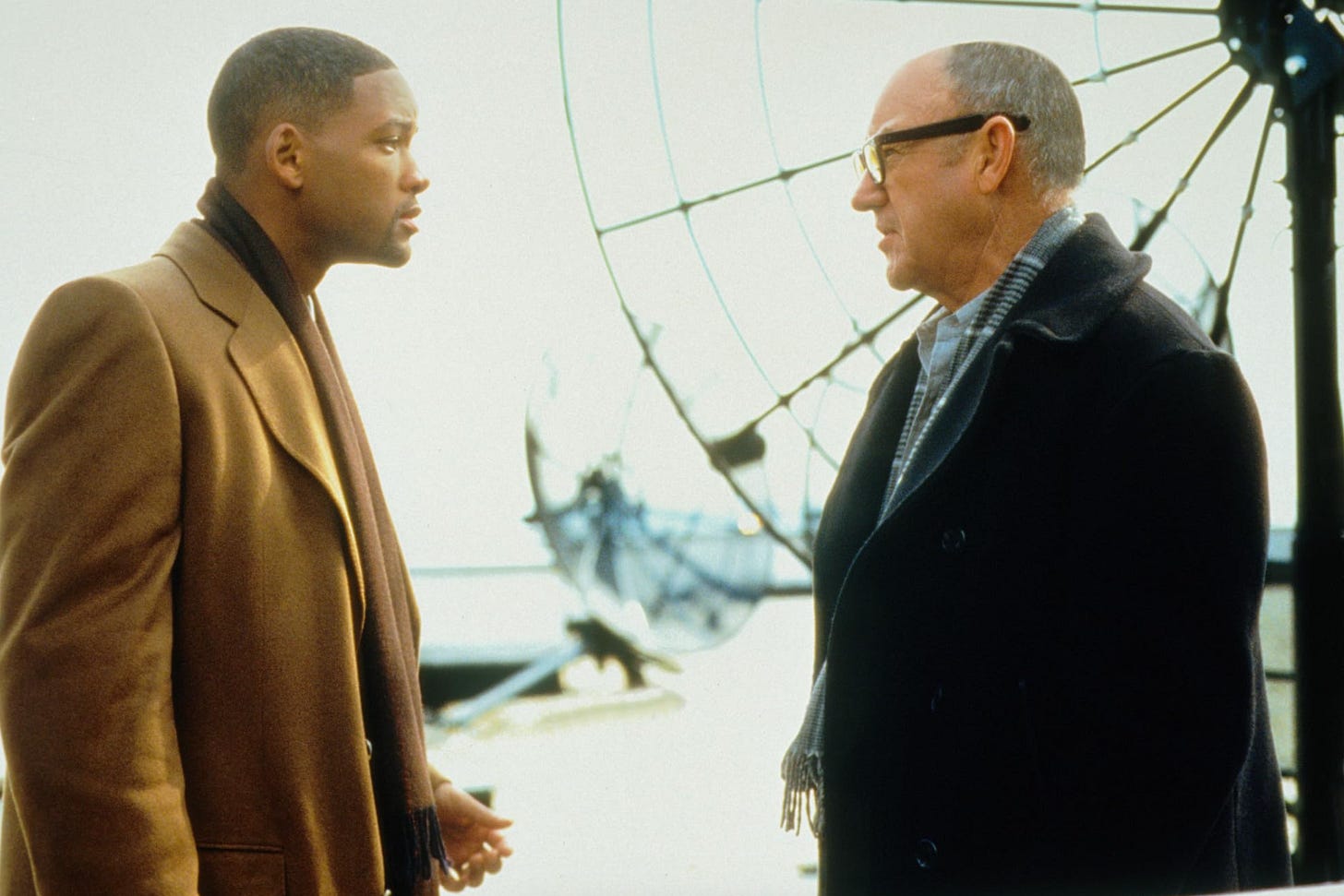My life as a fan began with Will Smith, the first non-cartoon celebrity I was conscious of. His early-nineties breakout, Fresh Prince, was perfect TV for a young child: sitcom-silly, family-friendly, and a little surreal for a 5-year-old, in the sense that the goofy, ebullient, and handsome Smith shared his name with his character (though the character’s Christian name was William, not Willard). When a teacher prompted my class to name a town other than our own, my hand shot up. “Bel-Air!” I didn’t know that Uncle Phil and Aunt Viv’s mansion was actually located in a neighborhood, in one of the biggest cities in the world.
Smith’s rise was, as they say, meteoric, with his music and movie careers swiftly gaining steam throughout the decade, much of it in similarly child- and family-friendly projects, from his starring turn in Men in Black (1997) to his debut solo album, Big Willie Style, that same year1. Though he’d already been a lead, along with Martin Lawrence, in Bad Boys (1995) and in the ensemble alien shoot-em-up, Independence Day (1996), he made his transition to serious leading man fare with Enemy of the State (1998), a movie that I joke was one of the first to radicalize me2.
In Enemy of the State, Smith plays Robert Clayton Dean, a labor lawyer who comes into unwitting possession of proof of a murder by an NSA operative greasing the wheels on Patriot Act-style “counterterrorism” legislation3. Dean’s life is summarily destroyed: his bank accounts are frozen and he’s framed as a cheater (his wife, played by Regina King, throws him out) and a money launderer, causing him to lose his job as well as his home. When he finally figures out what’s going on with the help of Brill (Gene Hackman), a rogue NSA comms expert, the situation only gets worse: the NSA murders one of Brill’s contacts and pins that on Dean, too.
A lot of stuff happens after that, but (spoiler alert), with the help of Brill, Dean finally exposes the conspiracy and clears his name (although the NSA is able to conceal its role in the snafu). The counterterrorism bill is scrapped, Dean reconciles with his wife, and Brill sends his regards from his retirement on a tropical island. All’s well that ends well, unless the government decides to come after Dean (or anyone else) ever again.
It’s probably for this reason that the “happy ending” of Enemy didn’t stick with me. What I do remember is Dean’s horrified realization that his bank accounts aren’t his anymore, that his wife hates him, that anything bearing his name—from his birth certificate to his driver’s license—is an implication, not a guarantor of his rights as an American citizen4.
As an adult, I’ve had the pleasure of seeing Gene Hackman5 in a role considered by some to be the origin of the Enemy universe: Harry, the “soul-sick, uneasy” surveillance expert of Francis Ford Coppola’s The Conversation (1974). Though his tough-guy mein makes him a great republican congressman (The Bird Cage [1996]), hard-nosed military man (Crimson Tide [1995]), or sleazy confidence man (The French Connection [1971]), Hackman is also capable of a professional disquiet that puts him at a compelling remove from his ordained authority; sanctioned yet straddling criminality, he shines in doubtful roles, like the queasy PI (Night Moves [1975]), or, in the case of Harry, the paranoid wiretapper.
One star in a constellation of New Hollywood’s paranoid cinema—Klute (1971), The Parallax View (1974), and All the President’s Men (1976) among them—The Conversation scratched an itch first initiated by its descendent, with its mistrust in and cynicism regarding institutions (particularly the government), all equipped with technology that not only allows them to eavesdrop on me with impunity, but to infiltrate, and even eliminate, my connection to other people. As Dean, Smith’s profound vulnerability, perhaps best encapsulated by the nightmare-like image of him running through rush-hour traffic in his open bathrobe, was a wake-up call to a younger version of myself, one for whom the reasons for being unable to access, for example, one’s bank account were still divided into fair and unfair.
Enemy isn’t why I’m a paranoid person, but I think about it more than I should because I’m a paranoid person, of which I was reminded after spending this past week in isolation when someone I love got COVID. An obsessive-compulsive germaphobe can get in their head about these things, and not just for their own sake; if the wind’s blowing in the right direction, I can decide that Jade is dying or dead ten times in a single hour. Given a chance to stew, the paranoia soon becomes despair, descending like a cloud of toxic pollen over my jellied brain. What’s the point, of anything? This risk is too much. Everything is too much. Everything is doomed. Why live? Why write?
When done well, paranoid cinema makes you feel as if your world has been shrunk to the size of a microchip. But if we travel back up the cylinder, the tube, the wire; back through Al Pacino’s mic in Serpico (1973) and John Travolta’s boom in Blow Out (1981); back out of whatever machine of surveillance we’re inside, we find ourselves in the moviehouse itself. Do you ever feel surrounded by art, but unable to see the project? Perhaps a reparative reading of paranoid cinema requires an expansion into other genres and histories, a look at the big picture—or multiplex, as it were.
Which brings me to something written this week by Maya Cade. Film-lovers should be paying attention to Cade’s work with the Black Film Archive generally, but this week she published a meditation on “the role the artist in Black cinema, life, and Palestine” that I think everyone should read. As Maya writes:
Artmaking, as Toni Cade Bambara said clearly, has been put in bondage to an industry that demands artists' silence in exchange for the will to continue practicing freely. The task ahead of us—filmmakers, writers, spectators, painters, cultural workers, and everyone in between—is to have the courage to act. We must ask ourselves: is our artmaking, our lives, our creative practice dedicated to justice or what is right for only us as an individual?
This piece is a reminder that art, as one of the highest expressions of humanity, is for serving people. I needed it this week, and am sharing it here because I feel certain that others do, too.
Gaza Funds aggregates fundraisers for people fleeing the violence of the Zionist entity, so if you’re looking to share some cash, please do. If you donate to any of the fundraisers featured there, send me a screenshot for a free month of subscriber-only DAVID content.
Thank you for reading and sharing my weekly newsletter. You can also support me by buying my book. Find me on Twitter and Instagram if you’re nasty.
To say Big Willie Style was more child- and family-friendly because of Smith’s refusal to use profanity while rapping is to capitulate to my white mom’s racist assumptions about what constituted “child- and family-friendly” music, rap or otherwise (the only other rap my mom would listen to was Eminem. Great stuff for a gay kid to hear their mom sing along to, but hey, he was white!). But I think it’s also safe to say that this was a function of Smith’s sanitized image, key to attaining his stated goal of becoming “the biggest movie star in the world,” which he pretty much crushed.
Michael Mann’s Ali (2001), one of the only Manns I haven’t seen because I don’t go for biopics, was when Smith got his Best Acting Oscar.
Released a little under three years before 9/11, Enemy of the State has since been acknowledged for anticipating the repressive surveillance expansion authored by the Bush administration.
It goes without saying that these supposed rights are not assured for any citizen, something that Dean is already aware of as a Black man and labor lawyer.
Goin’ strong at 94, baby. Jade is always like, Why do you think THAT man is hot? And it’s true that I’m drawn to the cornfed linebacker daddy thing. But it’s also a certain soulfulness that’s best on display when he’s playing a character doing his damnedest to repress it.




lots i relate to here.. plus a number of movies i love... and hackman a forever crush i think <3 because of seeing birdcage as a child lol (much to unpack there) ... sending love
thanks for sharing…breathe